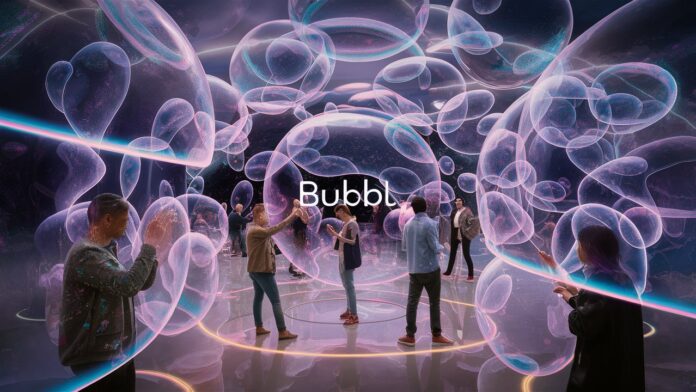Introduction
In an era dominated by permanent digital footprints and algorithmic surveillance, a paradigm shift is emerging. Enter Bubbl—a groundbreaking platform redefining online communication through transient, intimate digital spaces. Unlike traditional social media, Bubbl embraces the philosophy that not every conversation needs immortality. By creating ephemeral discussion environments that vanish after participation, Bubbl prioritizes authenticity over curation, psychological safety over performativity, and human connection over data harvesting. This article explores how Bubbl’s innovative architecture fosters genuine interaction while confronting modern digital fatigue, offering a sanctuary for unfiltered dialogue in an age of perpetual documentation.
The Philosophy of Ephemeral Engagement
Bubbl’s core ethos challenges the permanence plaguing modern digital interactions. Where platforms like Facebook or Twitter archive content indefinitely—fueling anxiety over past posts—Bubbl’s conversations dissolve after 24 hours. This temporality mirrors organic human interaction: thoughts are exchanged, emotions processed, and moments released. Psychologists note this reduces “digital self-censorship,” allowing users to share vulnerabilities without fear of future repercussions. Bubbl’s design acknowledges a universal truth: some conversations are meant to be felt, not fossilized. By decoupling dialogue from permanence, it cultivates psychological safety, encouraging raw, honest exchanges that rebuild eroded trust in virtual spaces.
Architectural Anatomy: How Bubbl Functions
Bubbl’s infrastructure merges intuitive design with robust privacy engineering. Users initiate “Bubbls”—temporary chat rooms centered on themes (#MentalHealth, #ClimateAction) or spontaneity (“Midnight Philosophy”). Each Bubbl employs end-to-end encryption, ensuring only participants access content. Crucially, metadata (e.g., user identities, timestamps) auto-deletes upon room expiration, leaving no forensic trail. The interface avoids likes, shares, or follower counts; interactions are purely text/voice-based, minimizing performative pressures. Machine learning moderates toxicity in real-time without storing data, while a “Consent Layer” requires opt-in permissions for each discussion. This architecture doesn’t just protect privacy—it redesigns social incentives, rewarding presence over prestige.
Psychological Liberation in Digital Spaces
Bubbl’s impact transcends functionality, addressing mental health crises exacerbated by traditional social media. Studies link perpetual online self-documentation to anxiety, depression, and identity fragmentation. Bubbl counteracts this by enabling compartmentalized expression: users explore facets of selfhood without conflating them into a monolithic “profile.” A therapist-hosted Bubbl about grief, for example, lets participants share sorrow without branding themselves “the bereaved.” Neuroscientists observe decreased cortisol levels in Bubbl users, attributing this to the platform’s “digital catharsis” effect—the brain processes emotions more healthily when freed from permanence. This liberation from the highlight reel mentality fosters deeper self-acceptance and collective empathy.
Societal Implications: Trust and Community Building
Beyond individual wellness, Bubbl rebuilds communal trust in fractured societies. Its ephemerality mitigates “context collapse”—the flattening of diverse social audiences into one—by allowing context-specific conversations. A Bubbl for political debate enforces time-bound civility rules; one for creative writing thrives on constructive feedback. Communities like “Recovery Bubbls” for addiction support leverage anonymity-as-a-tool: participants disclose struggles without exposure to search engines or employers. Crucially, Bubbl’s business model avoids ads/data sales, sustaining itself via optional micro-donations to moderators. This creates aligned incentives: value stems from service quality, not engagement metrics. Early adopters report unprecedented cross-cultural dialogues—Israeli and Palestinian youths sharing fears, or CEOs and frontline workers problem-solving—proving impermanence can seed lasting understanding.

Challenges and Ethical Frontiers
Despite its promise, Bubbl navigates complex ethical terrain. Ephemerality complicates accountability: without records, moderating hate speech or illegal activity relies on real-time AI, which risks errors. The team partners with digital rights groups to refine harm-detection algorithms while resisting surveillance demands from governments. Another tension lies in preserving meaningful exchanges: should users archive life-changing conversations privately? Bubbl’s compromise allows personal, encrypted saves—but never public permanence. Additionally, accessibility gaps persist; Bubbl’s text-heavy interface challenges visually impaired users, prompting collaborations with screen-reader developers. These dilemmas underscore a broader question: how to balance safety, memory, and ethics in transient spaces—a frontier Bubbl continues to map transparently.
Conclusion
Bubbl emerges not merely as an app, but as a cultural corrective to the digital age’s excesses. By honoring the beauty of fleeting moments, it restores what technology often strips away: the courage to be imperfect, the grace to evolve, and the humility to listen. In a world drowning in data, Bubbl’s radical ephemerality offers oxygen—a reminder that connection thrives not in curated archives, but in the vulnerable, vanishing now. As we navigate an increasingly digitized future, Bubbl’s greatest innovation may be its humanistic blueprint: that sometimes, the most profound bonds are those that leave no trace but transformation.
Frequently Asked Questions (FAQs)
Q1: Is Bubbl truly anonymous?
While Bubbl encrypts identities during active sessions, initial sign-up requires email/phone verification to deter bots. However, this data is never linked to specific conversations. Within a Bubbl, you’re identified only by a self-chosen pseudonym, and all metadata evaporates post-session. True anonymity? Nearly—but responsibly designed to prevent abuse.
Q2: Can law enforcement access Bubbl conversations?
No. Bubbl’s zero-data-retention policy means expired chats are irrecoverable—even by the company. For active Bubbls, end-to-end encryption ensures only participants hold decryption keys. Legal warrants cannot retrieve content that no longer exists.
Q3: How does Bubbl sustain itself financially?
Bubbl rejects ad-based models. Instead, users can tip moderators (who host popular Bubbls) or subscribe to premium features like custom themes. A “Guardian Fund” also allows donations to maintain free access for marginalized communities.
Q4: What stops harmful content in real-time?
Bubbl’s AI scans for hate speech, threats, or illegal material during sessions using on-device processing (no cloud storage). Flagged content triggers human moderators who can disband Bubbls instantly. Users can also block/report anonymously.
Q5: Can I recover a meaningful conversation after a Bubbl expires?
By design, expired Bubbls vanish permanently. However, users can manually save their own text via encrypted personal journals within the app—a compromise between memory and ephemerality. Shared content cannot be retrieved without consent from all participants during the live session.
Q6: Will Bubbl expand to voice/video features?
Voice-based Bubbls are already in beta! Video is being explored cautiously to preserve bandwidth accessibility and avoid “Zoom fatigue.” Core principles—encryption, auto-deletion, and opt-in consent—will govern any expansion.

